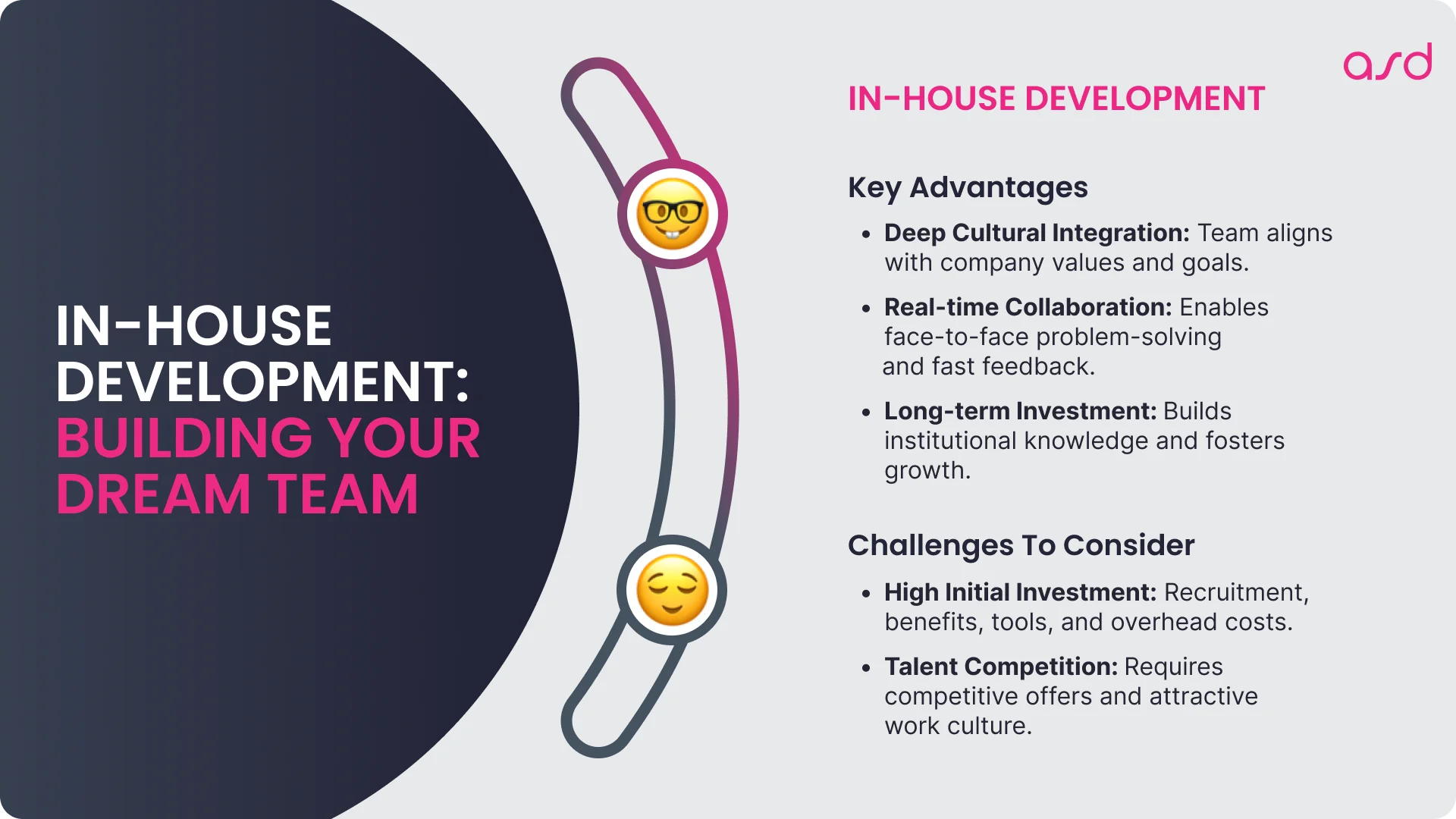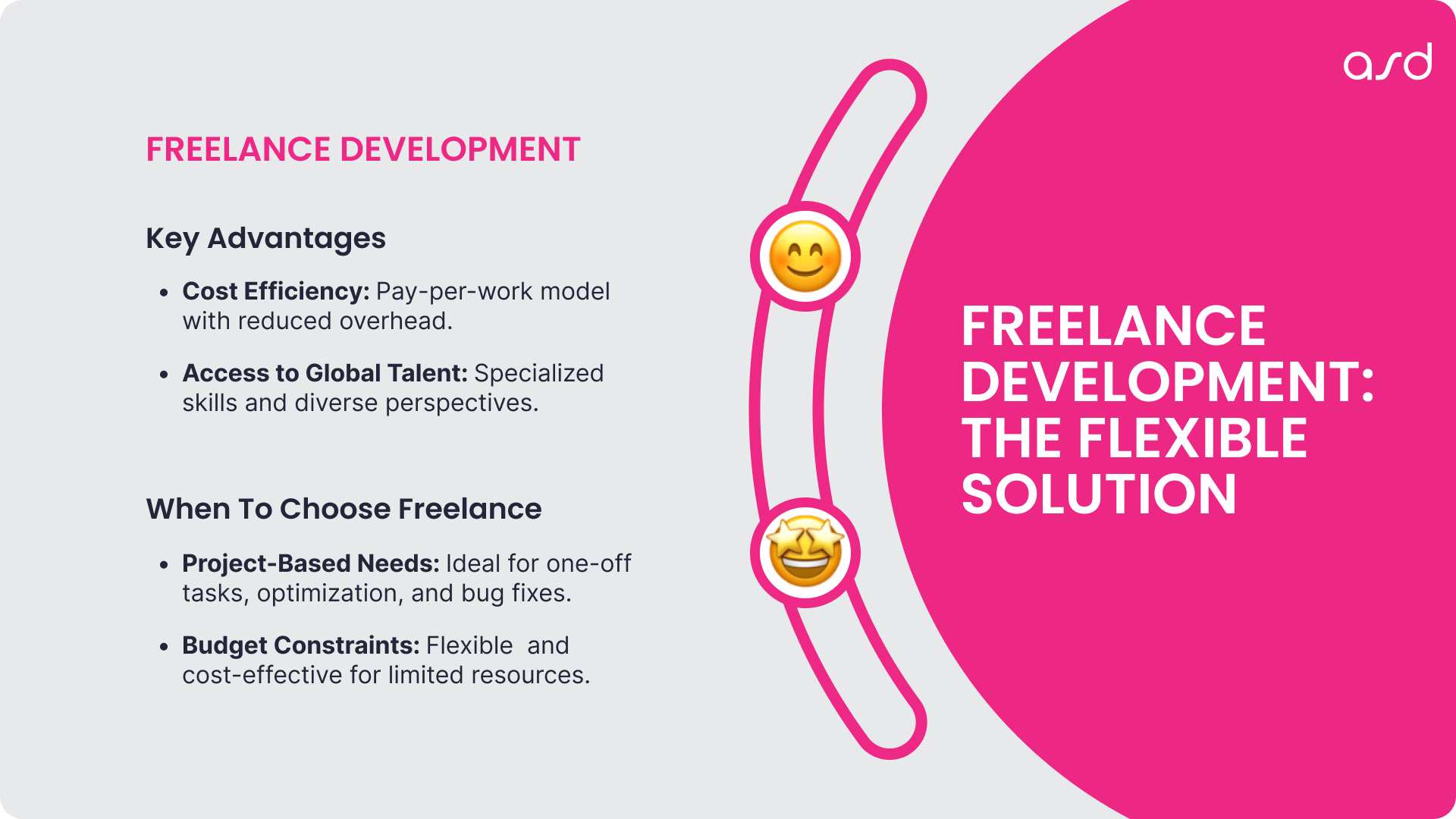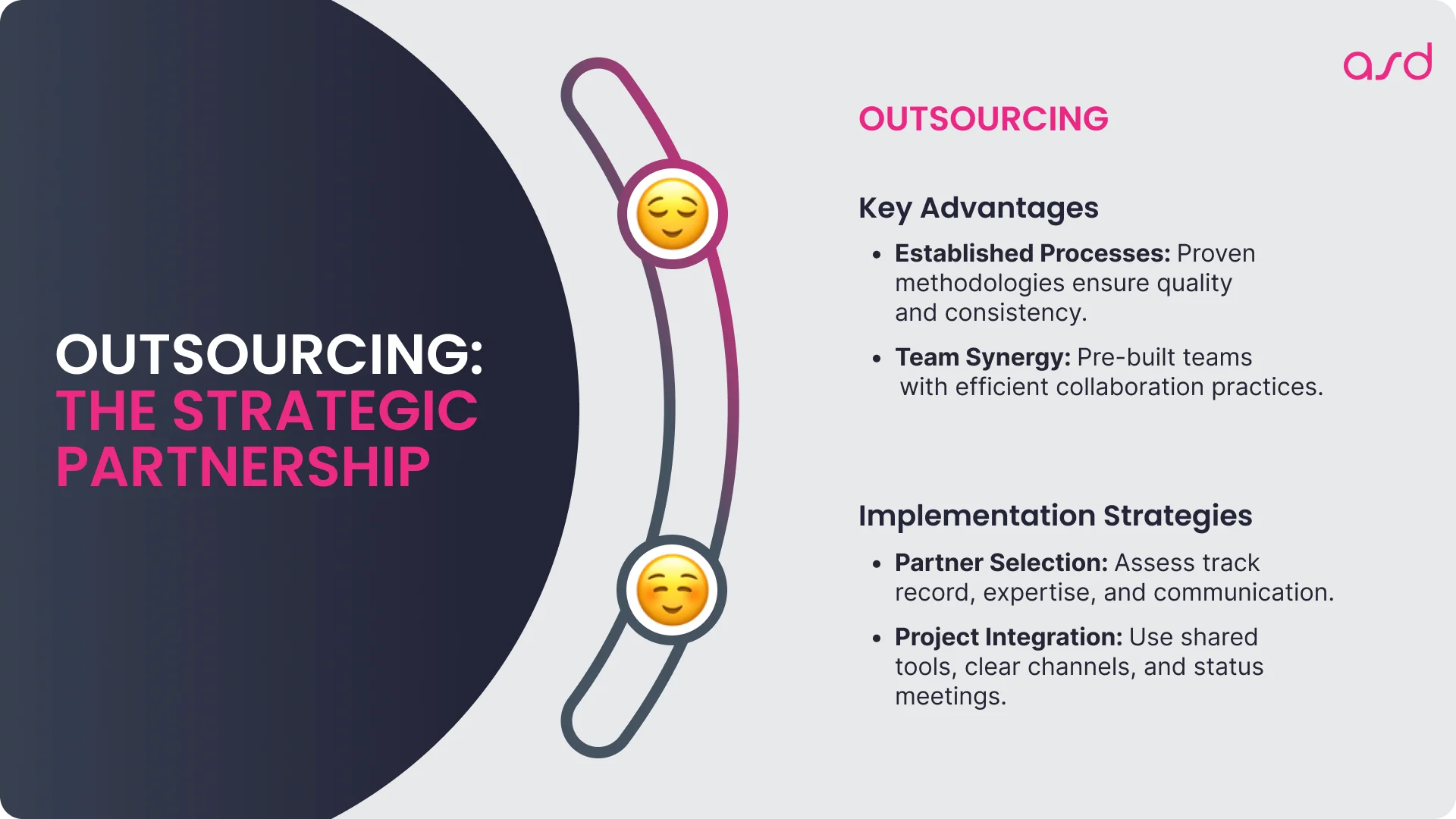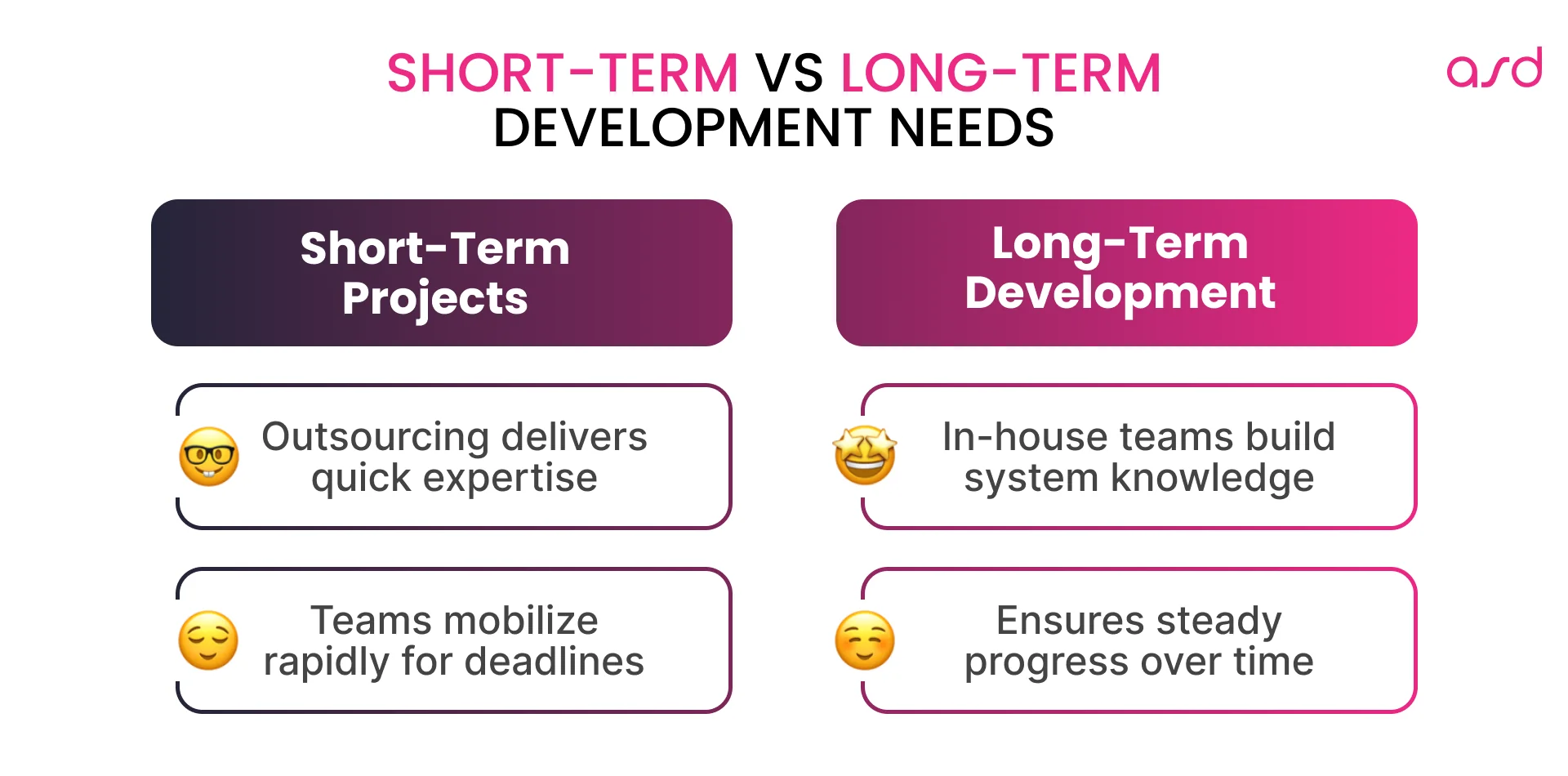Table of Content
- Understanding Projects' Requirements
- In-house: Building Your Dream Team
- Freelance: The Flexible Solution
- Outsourcing: The Strategic Partnership
- The Hybrid Approach
- Final Thoughts
Ready to outsource your project?
Book a callYou’ve got a brilliant idea for a software product, or you need to build software from scratch. Maybe it’s a game-changing app, an innovative platform, or a crucial internal tool for your business. The excitement of possibility is there, you even have a software development plan, but now you’re facing a critical question: Who’s going to build it: in-house vs outsource software development, or freelance?
This is a crossroads every tech entrepreneur, business leader, or project manager faces. Whether you’re a startup founder with a revolutionary idea, an established business needing to digitize operations, or a company looking to expand your software capabilities, you’ll need to make a crucial decision about your development team.
The choice isn’t simple: in-house development vs outsourcing vs freelance developers? Each path has its own merits, and choosing the wrong one can cost you time and money, potentially affecting the success of your project.
When and why is each variation valid to choose? Before blindly choosing just “any” of these development approaches, you need to understand the specific goals of your project. Suppose you need a constant working force for ongoing development. In that case, choosing an in-house team might be ideal (though they don’t necessarily need to handle every aspect – for example, system installation might be better handled by an outsourced team with specialized expertise). Trust us, you absolutely will face this choice, and the success of your project depends on making the right decision.
In-house vs Outsourcing: Understanding Your Project Requirements
When comparing in-house vs outsourcing software development, your project’s timeline emerges as one of the most critical decision factors. Let’s examine how different development approaches align with various timeline needs.
Short-term vs Long-term Development Needs
The choice between freelance vs in-house development vs outsourcing often hinges on your project’s duration. Projects with a defined endpoint, such as building a minimum viable product (MVP) or creating a one-off application, have requirements different from those of ongoing development efforts.
For short-term projects, outsourcing software development often makes more sense than building an in-house team. Outsourced or freelance teams can provide focused effort without requiring long-term commitments. They can mobilize quickly and bring immediate expertise to your project.
In contrast, if you’re planning continuous development work, in-house software development typically justifies the initial investment. An in-house team can grow with your project, developing a deep knowledge of your business and systems over time.
Time-to-Market Urgency: in-house development vs outsourcing
Your market timing can significantly influence whether you choose in-house vs outsourcing software development. Here’s why:
- In-house teams require time to build and train, which can delay your project’s start
- Outsourcing software development can provide immediate access to skilled teams
- When facing tight deadlines or competitive pressure, outsourced teams can often hit the ground running
- The choice impacts not just initial development but also future maintenance and updates
Development Phase Requirements
Different phases of your project might benefit from different team structures. Consider these approaches:
- Initial development might require a large outsourced team for rapid progress
- Core feature development might be better handled by an in-house team
- Maintenance could be managed by a smaller group, either in-house or outsourced
- Specialized features might benefit from targeted outsourcing
The key is to choose a solution that can adapt as your project evolves. Many successful projects combine both in-house and outsourcing approaches at different stages to maximize efficiency and results.
Technical Complexity
When deciding between in-house vs outsourcing, the technical requirements of your project play a crucial role. Your choice of development approach must align with:
- Technology Stack Requirements:
Your choice of technologies can limit or expand your options for development teams. Some technologies might require specialized expertise that’s hard to find locally, making outsourcing or freelance developers more attractive. Consider whether your stack is:
- Mainstream and widely available
- Highly specialized and requiring rare expertise
- Legacy systems requiring specific experience
- Cutting-edge technology with a limited talent pool
- System Integration Complexity:
How your new development will integrate with existing systems can influence your team’s choice. Complex integrations often benefit from having an in-house team that can deeply understand your infrastructure, while standalone systems might be more suitable for external development.
- Scalability Considerations:
Your growth projections should influence your team structure. In-house teams can provide consistent scalability but require significant investment. Outsourcing can offer quick scaling but might face communication challenges as the team grows. Consider both your immediate needs and future growth plans.
Business Context
Understanding your business environment is crucial for making the right choice between inhouse vs outsource software development. Here’s what to consider:
- Budget and Financial Constraints:
Financial considerations go beyond simple hourly rates. An in-house team requires significant upfront investment and ongoing costs, while outsourcing or freelance solutions might offer more flexibility but could be more expensive in the long run. Consider:
- Available capital for team building
- Ongoing operational budget
- Cost predictability requirements
- Return on investment expectations
- Intellectual Property Concerns:
The sensitivity of your project’s intellectual property can significantly impact your choice. In-house teams offer the most control over IP, while outsourcing requires careful contract structuring and trust-building. Consider:
- Trade secrets and proprietary algorithms
- Patent-pending technologies
- Competitive advantage protection
- Data security requirements
Regulatory Environment:
Different industries face varying levels of regulatory scrutiny. Healthcare, finance, and government projects often have strict compliance requirements that might favor in-house teams or carefully selected outsourcing partners with appropriate certifications.
Find Your Perfect Development Team Solution
In-house Development: Building Your Dream Team
In-house development represents a significant commitment to building and maintaining your own development capabilities. Let’s explore what this really means for your organization:
Key Advantages
- Deep Cultural Integration:
When developers work directly within your organization, they become deeply immersed in your company’s values, goals, and ways of working. This integration goes beyond simply understanding requirements – it means your team inherently knows why certain decisions are made and how they align with broader business objectives. They participate in company events, informal discussions, and the daily rhythm of your organization, leading to better-aligned solutions.
- Real-time Collaboration:
Having your development team in-house enables immediate, face-to-face collaboration that can significantly speed up decision-making and problem-solving. When a critical issue arises, team members can quickly gather, discuss, and implement solutions. This proximity also facilitates:
- Impromptu brainstorming sessions
- Quick clarifications of requirements
- Immediate feedback on implementations
- Faster resolution of blockers
- Natural knowledge sharing between team members
- Long-term Investment:
Building an in-house team represents an investment in your organization’s future. As team members grow with your company, they accumulate valuable knowledge about your:
- Systems and architecture
- Business processes
- Customer needs
- Historical decisions and their context
- Industry-specific challenges This institutional knowledge becomes increasingly valuable over time and can be passed on to new team members.
Challenges to Consider
- High Initial Investment:
The true cost of building an in-house team extends far beyond salaries. You’ll need to consider:
- Recruitment costs and time
- Employee benefits packages
- Office space and utilities
- Development tools and licenses
- Training and professional development
- Management overhead
- HR support and administration These costs can be particularly challenging for smaller organizations or startups.
- Talent Competition:
In today’s competitive tech market, attracting and retaining top talent is a significant challenge. You’ll need to:
- Offer competitive compensation packages
- Provide engaging work and growth opportunities
- Create an attractive company culture
- Invest in modern tools and technologies
- Consider location and remote work options
- Manage career development and progression

Freelance Development: The Flexible Solution
Freelance development offers a flexible approach to building your platform, or ota software development, ect., with its own unique characteristics:
Key Advantages
- Cost Efficiency:
Working with freelancers can provide significant cost advantages through:
- Pay-for-work model eliminating idle time costs
- No long-term financial commitments
- Reduced overhead expenses
- Flexibility to scale up or down quickly
- Access to global rate arbitrage, however, this efficiency depends on proper management and clear project scope.
- Access to Global Talent:
The freelance market opens up a world of specialized skills:
- Experts in niche technologies
- Industry-specific experience
- Diverse cultural perspectives
- 24/7 development capability through different time zones
- Varied problem-solving approaches
When to Choose Freelance
Understanding the ideal scenarios for choosing freelance developers can help ensure project success:
Project-Based Needs
When your development requirements are well-defined and contained, freelancers can be extremely effective. This works best for:
- One-off projects with clear endpoints
- Specialized feature development
- Technical debt cleanup
- Performance optimization
- Bug fixing and maintenance
Budget Constraints
Freelancers can help organizations with limited resources by providing:
- Flexible payment terms
- No long-term commitments
- Ability to pause work when needed
- Cost-effective specialized skills
- Reduced infrastructure costs

Outsourcing: The Strategic Partnership
Outsourcing represents a middle ground between in-house and freelance development, offering structured external development resources. For example, a notable advantage of outsourcing software development in Ukraine is access to a vast pool of highly skilled developers, competitive pricing, and a strong reputation for delivering quality projects on time.
Key Advantages
- Established Processes:
Professional outsourcing companies bring tested development methodologies:
- Documented workflows
- Quality assurance procedures
- Project management frameworks
- Communication protocols
- Risk management strategies
These processes can help ensure consistent delivery and quality.
- Team Synergy:
Outsourced teams often come pre-built with established working relationships:
- Experienced in collaborating together
- Understanding of each other’s strengths
- Established communication patterns
- Shared technical vocabulary
- Efficient problem-solving dynamics
Implementation Strategies
Successfully implementing an outsourcing strategy requires careful planning:
Partner Selection
Choose your outsourcing partner based on:
- Track record in your industry
- Technical expertise alignment
- Communication capabilities
- Cultural compatibility
- Financial stability
- Security practices
- Quality certifications
Project Integration
Ensure smooth integration through:
- Clear communication channels
- Defined escalation procedures
- Regular status meetings
- Shared documentation practices
- Collaborative tools and platforms

The Hybrid Approach: Best of All Worlds
Many organizations find that combining different development approaches provides optimal results:
Common Hybrid Models
1. Core + Support Structure
This popular model maintains:
- Critical development in-house
- Routine maintenance outsourced
- Specialized skills through freelancers This approach helps balance control, cost, and capability.
2. Project-Based Mix
Organize teams based on project requirements:
- Strategic projects with in-house teams
- Peak loads handled by outsourcing
- Specialized features by freelancers This provides maximum flexibility while maintaining core capabilities.
Success Factors
To make a hybrid approach work effectively:
Clear Boundaries Establish:
- Well-defined responsibilities
- Decision-making hierarchies
- Communication protocols
- Quality standards
- Performance metrics
Integration Infrastructure Invest in:
- Collaboration tools
- Knowledge management systems
- Version control
- Project management platforms
- Communication tools
Ready to outsource your project? Book a free consultation with our experts to gain all of the insights

In-house Software Development vs Outsourcing vs Freelance — Final Thoughts
The comparison of in-house vs outsourcing pros and cons shows that choosing between these approaches isn’t about finding the “best” option – it’s about finding the right fit for your specific situation. Whether you opt for traditional outsourcing vs in house development or explore freelance software development opportunities, consider:
- Your project’s unique requirements
- Available resources and constraints
- Long-term business objectives
- Risk tolerance
- Market conditions
Remember that your choice isn’t permanent. As your organization grows and evolves, your development needs will change. The most successful companies maintain flexibility in their approach and aren’t afraid to adjust their strategy as circumstances change.
Questions? Answers!
Is freelancing cost-effective?
Yes, freelancing can be a cost-effective option for specific tasks or projects. However, for larger or more complex initiatives, outsourcing firms may provide better value due to their infrastructure and collaborative capabilities.
How does freelancing compare to outsourcing?
Freelancing is ideal for small-scale or short-term projects, offering cost efficiency and flexibility. However, outsourcing with a firm provides more structure, team scalability, and dedicated project management.
Is outsourcing reliable for long-term projects?
With proper contracts and communication, outsourcing ensures consistent quality and scalability for extended timelines.
Can outsourcing handle specialized technical needs?
Absolutely, outsourcing partners often provide niche expertise that may be hard to find locally.
Why should I choose outsourcing over in-house development?
Outsourcing provides immediate access to expert talent, reduces overhead costs, and accelerates project timelines.
How does outsourcing save money compared to in-house teams?
It eliminates costs for recruitment, training, office space, and long-term employee benefits.
Is outsourcing better for tight deadlines?
Yes, outsourcing firms often have pre-built teams ready to start, ensuring faster time-to-market.




